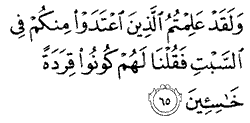Apes, Courteous Conduct, Positive Role
Issue 938 » March 17, 2017 - Jumada al-Thani 18, 1438
Living The Quran
Apes
Al-Baqarah (The Cow) Sura 2: Verse 65
 "And you are well aware of those amongst you who violated the Divine law in the matter of the Sabbath, so We said to them: 'Be you apes despicable.'"
"And you are well aware of those amongst you who violated the Divine law in the matter of the Sabbath, so We said to them: 'Be you apes despicable.'"
This is a punishment that they incurred as a result of their violation of the sanctity of Sabbath in blind pursuit of their desires. The scholars differ concerning the nature of their transformation into apes, and whether it was merely mental or had any bearing on their spiritual condition. In our view, this difference is of little real significance.
Where the human being and animals really differ is in the ability to reason and to make conscious moral decisions of their free volition. The true distinguishing feature of the human being is his ability to discriminate between what is permissible and what is not, his ability to restrain and control his desires and emotions and his ability to act within the prescribed moral limits, in order to satisfy his legitimate physical needs. As against this, an animal is not bound by any moral or legal rules. It knows no limits when pursuing its sensual gratification. It is driven by pure animal instincts and no moral considerations come into the equation. That is why, when a person or a group of persons is unconcerned with moral questions or rules of behaviour and their sole purpose is the gratification of their desires, howsoever possible, the line between the human being and an ape becomes blurred. In such a condition, there is no substantial difference between the two, the human and the animal, excepting a small difference in their physical appearances. As their moral and mental degeneration hits the bottom, even this seemingly slight physical difference between them also vanishes.
Compiled From:
"Pondering Over The Qur'an: Surah al-Fatiha and Surah al-Baqarah" - Amin Ahsan Islahi
Understanding The Prophet's Life
Courteous Conduct
Prophet Muhammad (peace be upon him) said, "My Lord has taught me manners, and thus gave me the best of manners." [Al-Shawkani] A litmus test of successfully refining the soul is the attainment of beautiful character, which culminates in what some refer to as courteous conduct (adab). The refined person is a beautiful person to interact with. His or her nature is pleasing to be around, and they are a source of ease and comfort to all who know them. This refined manner of interaction is the result of spiritual cultivation and was embodied by Prophet Muhammad.
Some scholars state that courteous conduct (adab) is a product of combining love with humility. The spiteful or arrogant heart cannot manifest courtesy to others. Such conduct is more than the actions we see; it is an expression of an inner beauty and serenity. This expression in turn fosters love between people. Islam's guidelines about the courteous conduct of daily life are meant to enhance overall social harmony, as a means to a spiritually healthy environment.
A believer should personify any conduct considered good-natured by societal norms. While particular manifestations of good conduct may vary in different cultures, a believer rightfully takes up any form of virtue as his or her own. For example, in most cultures it is considered good etiquette to help a weak or elderly person carry groceries or cross a busy street— and so it is clear that a believer should strive to do such things. The universal call to refined behavior may manifest in different ways for different societies, but all are essentially outward manifestations of an inward beauty.
Compiled From:
"Being Muslim: A Practical Guide" - Asad Tarsin
Blindspot!
Positive Role
The distressing picture of men-woman relations in contemporary Muslim societies, which contradicts the teaching of Islam, is a concrete fact that cannot be denied. However, another positive fact that exists side by side, is that an awareness of the essential and constructive role of women in the society to fulfill their Islamic responsibilities, is increasingly appreciated among Muslim men and women.
The divine guidance in the Quran and Sunna, and many positives in our intellectual and practical heritage, have increasingly inspired and generated new works that advocate the rights of Muslim women in the name of God and His message.
Day after day, Muslim are becoming more and more aware of the due distinction between the permanent teachings of the divine sources of Islam and the accumulated human ideas and practices that were influenced by the cultural and social circumstances in the Muslim societies, in the past and the present.
Conceptual and behavioral progress is apparent now in Muslim societies, which seem more keen to observe the divine teachings and abandon the human deviated customs in man-woman relations in the family and the society. Women's education and work in different fields have developed their personality, self-confidence and initiatives. An awareness of their Islamic rights and responsibilities has inspired many of them to be committed to the Islamic message of justice, peace and prosperity. These concrete developments have provided a support for the Muslim woman, stronger than any philosophical or legal argument. On the other hand, Muslim men have realized the social change and have become more inclined to deal with it. Muslims cannot reactivate their societies, secure a positive role in the contemporary world and get their message heard by all people, while a half of their population is suppressed or neglected.
How can Muslims call universally for a divine justice, while they are missing or ignoring it among themselves, their homes and their communities? Progress can be obviously noticed... and hopefully it will continue and accelerate, benefiting Muslims in the first place, and then representing the message of Islam to the whole world appealingly.
Compiled From:
"Muslim Women" - Fathi Osman